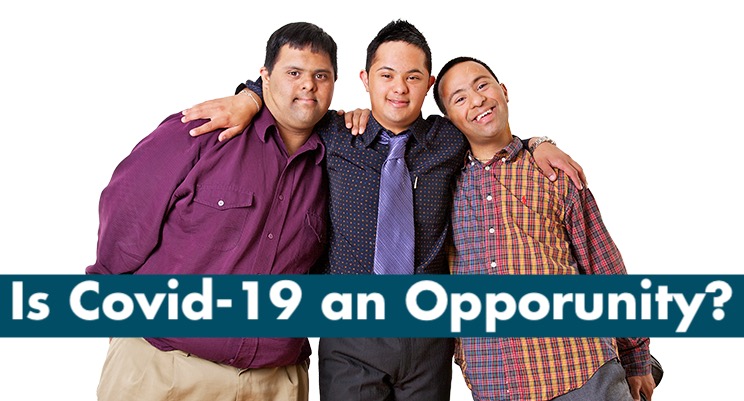As every human service organization on the planet will be in, or is approaching, its own “state of emergency” here are some words to consider.
This is not medical advice. There are plenty sources of advice from Governments for dealing with the health and economic implications of the pandemic. Go there or ask your employer if you need advice.
Instead the six points below seek to connect us to the experience of people with intellectual disabilities in a pandemic.
1. Promote reassurance, not fear or anger.
Many workers will be scared, as will the people we support. Fear is more infectious than COVID 19. Frightened people need reassurance. It’s hard to give to people supported when we can’t dig deep and find the strength to reassure ourselves and our families. So, build the future you want to be part of.
2. Choose inter-dependency, allow and enable people to “give”.
A lifetime of dependency leads to dependency. Perhaps it’s time to think about inter-dependency and work out how people we support can “support” the people who support them. That would be a great outcome from the pandemic. Power relationships finally equalized. All that work we’ve done on “gifts and talents” should support us to work out how.
3. Choose to see strategies, not behaviors.
Frightened people express themselves more emphatically. When routines that people rely on to understand their world begin to disassemble (they surely will as services close and shift from individualized support to basic cover and risk management) some are going to express their fear emphatically, potentially to workers who don’t know them like regular staff or family. Let’s choose to see “confused, scared and frightened” as strategies people use to cope, NOT “behaviors”. Let’s “Normalize the worry” and rewrite people’s stories.
4. Choose honesty.
People who find things difficult to understand need stuff explaining in simple terms. Nothing new there. Adults need to be treated like adults and not cosseted to ease our working life. The rule of thumb is “tell it like it is, simply, and then help people to work things out in a way that makes sense to them”.
5. Choose relationships, they matter.
We’ve talked forever about the importance of continuity in human services without really agreeing what we mean. For some it means an “activity timetable” and for others “everyone saying the same thing”. In unprecedented times continuity fundamentally means “people who know me and relationships I can trust”. If everything changes let’s make “relationships” the bottom line. “Relationships I can trust”. Keep them intact. If you can’t be there in person you can still get to someone by Skype, Facetime or a similar platform. You can still offer connection when self-isolated. You can still support your colleague who doesn’t know someone as well as you do.
6. Build connection.
Human services support some lonely people. Some have no-one in their life who isn’t paid. Brilliant support services have worked hard to build community connections for people many of which, like clubs and groups, will now be suspending activity. Maybe it’s time to reach beyond the activity to secure individual “connections”. It’s what we always meant to do, but the current crisis allows us to be blunt and “ask” for help and connection. Get brave. Ask people in your community to help!
Human services will go one of two ways. Some will hold on to the humanity of our work, preserve the intimacy of relationships and help workers and the people supported to hold on to those. Others will suffocate under changing rules, guidance and procedures. There’s more than one kind of “health” for us to maintain. Rules place emphasis on physical health, for good reasons, but mental health matters too. Choose physical and mental well being.
With the right approach it’s just possible that a pandemic could release people from old stories. Extraordinary circumstances offer extraordinary opportunities. Let’s be brave, focus on that possibility and use crisis as leverage we have always needed to build a future that we didn’t manage to out of the ordinary.
By Judith North
Judith has worked in social care since 1986 and now runs Orenda. Orenda provides training and consultancy focused on improving the lives of people who use and work in human services organizations. Judith is featured in and helped to write ‘Autism’ and ‘Autism and Sensory Processing’ for Open Future. More about these modules:
Autism: This module combines a straightforward introduction to autism with a broad range of practical strategies and approaches. The short films within the module balance the personal perspectives of people who have autism with the opinions and experiences of a number of leading professionals.
Autism and Sensory Processing: This module expands on the learning provided in our module “Autism.” Please complete that module first. Understanding and gaining insight into your processing system takes time and effort. Understanding someone else’s requires really careful observation, imagination, and empathy. In this module you will learn how your processing works and in turn we will teach you how to better understand and assist the processing realities of the people you support.
Email hello@openfuturelearning.org to schedule a demo of the Open Future resource and then receive your first month free – no contract of use.
Learn more about all of our modules here.


